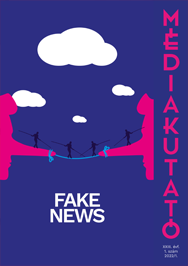Contents – Spring 2022
Bódi, Jenő – Polyák, Gábor – Urbán, Ágnes:
Bódi, Jenő – Polyák, Gábor – Urbán, Ágnes:
The changing concept of fake news in public service news
In Hungary in 2020, after the emergence of the Covid-19 pandemic, government communication began to accuse critical media of spreading fake news. This typical tool of populist politics has taken on a new colour in Hungary: fake news accusations have also been used against opposition politicians. This analysis looks into content on fake news published over the past decade on Hirado.hu, the news site of the Hungarian public service media. It does not study fake news items that may be published there, but looks into what the concept 26 Bódi Jenő–Polyák Gábor–Urbán Ágnes means in the public discourse on the basis of the articles on Hirado.hu, and how the meaning of the term has evolved over time; for example, whether populist fake news accusations targeting the media and the domestic opposition appeared before 2020.
Keywords: content analysis, fake news, MTVA, news media, populism, public service media
The changing concept of fake news in public service news
Médiakutató Spring 2022 pp. 7-26
Bátorfy, Attila:
Bátorfy, Attila:
The purchased public sphere
This paper examines the Hungarian government’s media subsidisation and state advertising practice based on the notion “subsidised speech” as studied in the American constitutional law. It attempts to conceptualise the collision between the government’s right to speech and the citizens’ basic rights and the public interest.
Keywords: freedom of speech, public discourse, state advertising, state subsidy, subsidized speech
Médiakutató Spring 2022 pp. 29-43
Gosztonyi, Gergely:
Gosztonyi, Gergely:
A typology of censorship in the light of a brief history of political censorship
The history of censorship is as old as the history of mankind, but Hungarian-language summaries of censorship theory and history are currently not in the mainstream of research. There are countless definitions of what exactly censorship is, but there is no uniformly accepted one. The aim of this paper is thus to place the most common form of censorship in a diachronic context, which it does by embedding it in a theoretical and historical context. Drawing on the thousands of cases included in the Green–Karolides and Jones encyclopaedias of censorship, this paper attempts to nuance the colloquial notion of censorship and to construct a typology that can help us understand when and for what reasons various types of content intended for the public were banned in the past. The study will present the main theories of censorship from Antiquity to the end of the 20th century, as well as the ways in which content restriction has been implemented in practice.
Keywords: Areopagitica, Bentham, censorship, economic censorship, freedom of the press, Gutenberg, Index Expurgatorius, Index Librorum Prohibitorium, Mill, Milton, new censorship theory, Plato, political censorship, self-censorship, Sollicita ac Provida, Tindall
A typology of censorship in the light of a brief history of political censorship
Médiakutató Spring 2022 pp. 45-57
Egres, Dorottya:
Egres, Dorottya:
The discursive sanctioning of political incivility in the Blanka Nagy case
Blanka Nagy, a high school student spoke up at a protest organised against the Hungarian overtime law in 2018. In her speech, she uttered profanities against the ruling political elite. This paper explores a case of incivility that broke the norms of political communication, while discussing the context-dependency and politically motivated nature of discursive sanctioning. It employs the methodology of frame analysis and studies how the most visited news media outlets and the comments under the news articles shared on social media framed and discursively sanctioned the high schooler and her profanities. Its findings suggest that the positive framing of the incivility can be tied to the addressees of the speech, while the negative framing can be connected to the attributes of the speaker
Keywords: Blanka Nagy, discursive sanctioning, framing, incivility, news media, political communication, profanity, social media
The discursive sanctioning of political incivility in the Blanka Nagy case
Médiakutató Spring 2022 pp. 61-70
Német, Szilvi:
Német, Szilvi:
The takeover of the mainstream – political agitation and postmodern visual strategies
This paper explores the emergence of postmodern visual strategies currently associated with online meme culture. It argues that the subversion of popular images has been a part of the toolset of predominantly leftist artistic, social and political movements since the historical avant-garde, but has resurfaced after the Millenium as a key rhetorical and visual device in the online culture of the (far) right. It also discusses the implications of the asymmetry in academic research in which the online left stays disproportionately off the radar when it comes to studying online political cultures.
Keywords: artistic and social movements, appropriation, internet meme, political discourse, postmodern, visual culture
The takeover of the mainstream – political agitation and postmodern visual strategies
Médiakutató Spring 2022 pp. 71-86
Kuttner, Ádám:
Kuttner, Ádám:
Possibilities of examining contemporary multimedia applications in exhibition communication
To date, visitors can encounter a variety of applications based on augmented and virtual reality technology in museums. However, there are currently few evaluation methodologies available to professionals to analyse and evaluate these tools in exhibition communication. In my study, I present a possible research and evaluation method based on the methodology of visual framing, which took place in 2021 at the Ludwig Museum in Budapest with the participation of 47 people. The findings of the research will hopefully contribute to the development of similar studies and evaluation methods.
Keywords: augmented reality, exhibition communication, museum, museum education, new media, visual communication, visual framing, virtual reality
Possibilities of examining contemporary multimedia applications in exhibition communication
Médiakutató Spring 2022 pp. 89-98




